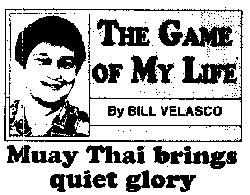|
ATBAP and Muay Thai
featured in Philippine Star
July 12,
1999
Sportswriter
and commentator Bill Velasco featured ATBAP and Muay Thai
in his column The Game of My Life on the July 12,
1999 edition of the Philippine Star. In his column entitled "Muay Thai
brings quiet glory", Mr. Velasco talked about the development
of Thai boxing in the Philippines as well as ATBAP's role in
its continuing development. He also featured excerpts of an interview
with ATBAP's Orlando Lapuz, and called out for more support
for Muay Thai in the Philippines.
Philippine
Star -
July 12, 1999
 |
The Philippines is usually
the victim of brain drains or technology transfer in sport. Some
of our basketball coaches are invited to coach national teams
of other countries, and our retired players conduct clinics for
youngsters in the United States. Some of our best billiards players
are hired to train cue artists in Japan. And even one of our
best arnisadors, bodybuilder and actor Roland Dantes, now lives
in Australia and trains their aspiring martial artists.
But there is one small band of intrepid Filipino sportsmen that
is turning the tables on this trend: the Amateur Muay Thai Boxing
Association of the Philippines (ATBAP). If you saw yesterday's
Knockout! on Studio 23, you caught a glimpse of two of our best
Thai boxers in a rare televised exhibition.
The ATBAP started in 1995, largely due to the efforts of Orlan
Lapuz, a smallish, soft-spoken local kickboxing champion and
former Philippine national team member in pencak silat.
"When he fought in the pencak silat World Championship in
Thailand, he saw the King's Cup (World Championship)," recalls
Orlan's wife, Nita, who assists him in running the organization.
"That gave him the idea to put up Thai boxing here in the
Philippines."
Muay Thai, according to ATBAP, is not to be confused with kickboxing.
Apparently, Germans amalgamated kickboxing from a variety of
sports, and only the fists and feet are used in striking and
scoring.
Muay Thai, meanwhile, may have originated a couple of hundred
years ago in the Thai military. In the old days, as some stories
go, it was considered a grave insult to even point your foot
at someone, much more to use it to strike. Therefore, to settle
many grievances and other disagreements, the sport was created
as a surrogate for brawling in the open. In Muay Thai, aside
from punching and kicking, a fighter is allowed to knee and elbow
the opponent. Holding, to some extent, is also allowed. Of course,
all competitors are required to wear head gear, body armor and
protective cups. And there are other traditional ceremonies,
as well. Players have traditional prayers to perform before a
bout, and they wear arm bands or praciat and sacred headbands
called mongkon. In Thailand, I'm told, women are not allowed
to touch a thai boxer's mongkon.
Here in the Philippines, Muay Thai is doing well, but lacks government
support. The Lapuz family members sustain both themselves and
their association by running the Thai boxing gym and the ATBAP
office in White Plains. And the organization has spread nationwide,
now boasting of small pockets of members in ten of the country's
regions.
"When Chairman Popoy Juico was still in the PSC, we would
still receive support somehow," Nita declares. "We'd
never get zero. In this new administration, we still have to
get anything."
And yet, the ATBAP continues to function, and, to their credit,
quite well. "We've held five national championships already,
the last one in May at the Pasay City Sports Complex," says
Orlan, now the president of ATBAP: "And we have been bringing
back medals from Asian championships anad the Asian Games. Our
fighters are hungry for bouts. You know Filipinos, we love contact
sports."
Due to their limited budget, the ATBAP was only able to send
three participants and two officials when Muay Thai made its
debut as a demonstration sport in the l3th Asian Games in Bangkok
last December. All three Filipinos brought home medals. Pinweight
Luis Rodrigo and bantamweight Rodolfo Baltazar earned bronzes,
and Orlan and Nita's 20-year old son, flyweight Randy Lapuz,
won a silver medal. Ironically, it was the Thai onrganizers who
provided for the Philippine team's airfare.
The ATBAP is holding its national capitol region championships
in November, and is planning a Southeast Asian championships
in preparation for the next King's Cup, which will be held in
Korea at a still undisclosed date next year. But they need help.
"We are very good," confesses Orlan Lapuz. "But
we need financial help. The sport is growing fast, and a lot
of people want to take it up." The ATBAP conducts free open
demonstrations in places like the Quezon Memorial Circle during
weekends, in the hope of recruiting more members: On cable, Muay
Thai is already receiving coverage from ESPN and other sports
programmers. Here in the Philippines, these simple, quiet trailblazers
have shown that it takes so little to become world class in a
sport that is on the cusp of being noticed in a big way all over
the world.
What will it take for them to get the help they deserve?
For any thoughts and comments, you can reach me at bill_velasco@hotmail.com. |
|

| home | about muay thai | about atbap | news and events |
| competitions | training | feature | links | contact us |
|



![]()